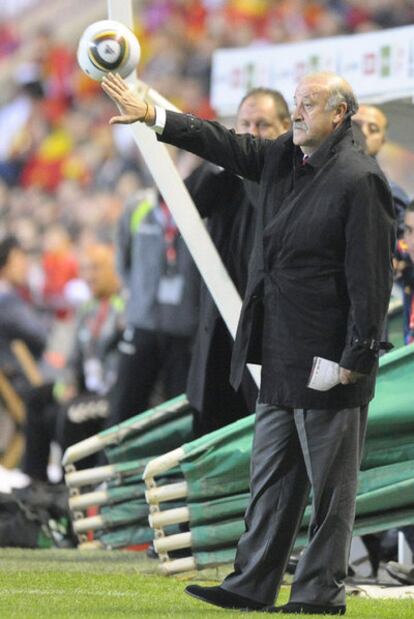Del Bosque makes history
National coach earns a record 39th win at helm of world's top-ranked team
Spain's routine 3-0 win over Venezuela on Tuesday was not one that will linger in the national memory in the same way as last year's tighter but more famous victory in Johannesburg, but it will be remembered as the one that made Vicente del Bosque the most successful coach in La Roja's history. Goals from David Villa - who took his tally for Spain to 47 - Pedro and Xabi Alonso gave the mustachioed mastermind a 39th win at the helm of the national side, one more than his predecessor, Luis Aragon¨¦s, in ten fewer matches. Spain has only lost four games - and curiously tied just one - under Del Bosque, two of them friendlies. The Manchegan has an 88 percentage win record compared with the Madrile?o's 70 percent.
"The wise man of Hortaleza," as Aragon¨¦s is known, is rightly lauded for laying the foundation for Spain's World Cup success in 2010, something Del Bosque has always been keen to highlight. After the 2006 World Cup, where France eliminated Aragon¨¦s' side in the first knock-out round, the former Atl¨¦tico and Real Madrid coach decided to overhaul the team's playing style. Xavi Hern¨¢ndez, who played in both the 2006 finals and the 2008 European Championships, recently praised Aragon¨¦s for introducing what the Barcelona midfielder termed los bajitos (the little ones) in qualifying for the tournament in Austria and Switzerland. What Aragon¨¦s had in fact patented later became familiar to the soccer world as tiki-taka - possession play and intricate short passes to open up opposition defenses - two years before Barcelona, under Pep Guardiola, would bestraddle the club game with the same formula.
Del Bosque, recognizing that, like Guardiola, he had inherited something special, described his own adaptation of Aragon¨¦s blueprint as "a tweak here and there." This is evidenced by the teams that lined up in Vienna and Johannesburg: Del Bosque's tweaks largely consisted of Bar?a youth stars such as Sergio Busquets, Gerard Piqu¨¦ and later Pedro Rodr¨ªguez joining club colleagues Xavi, Andr¨¦s Iniesta and Carles Puyol in the national side.
The primary casualties of the emergence of a true golden generation from the La Masia production line were the likes of Marcos Senna, Dani G¨¹iza and Santi Cazorla, who all featured in the 2008 final. Cazorla can consider himself unfortunate to have suffered from injuries, while Senna and G¨¹iza are extremely unlikely to pull on the red shirt again.
With a starting 11 that selects itself and the addition of young talents like Fernando Llorente, Jes¨²s Navas, Juan Mata and Javi Mart¨ªnez, Del Bosque's bench must draw venemous glances from his international coaching peers. In Johannesburg, when Spain defeated Holland, among the substitutes at Del Bosque's disposal were Cesc F¨¤bregas, Fernando Torres, David Silva, Mata, Llorente and Mart¨ªnez, not to mention two of the best goalkeepers in the world today, Pepe Reina and V¨ªctor Vald¨¦s.
However, Del Bosque's real victory is keeping so many household names happy. Many are the coaches who have bowed to media or fan pressure to field a favorite son - something Aragon¨¦s experienced when he dropped national treasure Ra¨²l - but Spain's current crop of players do not complain about waiting in the wings; their World Cup winners go a long way to ensuring cordial relations. Success breeds contentment.
But neither has Del Bosque rested on his laurels. Aritz Aduriz, Manu del Moral, Borja Valero and Bruno Soriano have all debuted since the World Cup, joining Nacho Monreal in a new wave of talented back-up to the established starters. "He is a great coach and we want him to continue with us for a long time," said Pedro after the Venezuela match. There seems to be little incentive for Del Bosque to do anything but.

Tu suscripci¨®n se est¨¢ usando en otro dispositivo
?Quieres a?adir otro usuario a tu suscripci¨®n?
Si contin¨²as leyendo en este dispositivo, no se podr¨¢ leer en el otro.
FlechaTu suscripci¨®n se est¨¢ usando en otro dispositivo y solo puedes acceder a EL PA?S desde un dispositivo a la vez.
Si quieres compartir tu cuenta, cambia tu suscripci¨®n a la modalidad Premium, as¨ª podr¨¢s a?adir otro usuario. Cada uno acceder¨¢ con su propia cuenta de email, lo que os permitir¨¢ personalizar vuestra experiencia en EL PA?S.
?Tienes una suscripci¨®n de empresa? Accede aqu¨ª para contratar m¨¢s cuentas.
En el caso de no saber qui¨¦n est¨¢ usando tu cuenta, te recomendamos cambiar tu contrase?a aqu¨ª.
Si decides continuar compartiendo tu cuenta, este mensaje se mostrar¨¢ en tu dispositivo y en el de la otra persona que est¨¢ usando tu cuenta de forma indefinida, afectando a tu experiencia de lectura. Puedes consultar aqu¨ª los t¨¦rminos y condiciones de la suscripci¨®n digital.








































